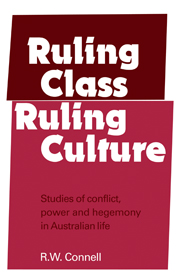Book contents
- Frontmatter
- Contents
- Table and Figures
- Preface
- Acknowledgements
- 1 Approach to class analysis
- 2 The idea of class in Australian social science
- THE RULING CLASS
- THE RULING CULTURE
- 7 Class consciousness in childhood
- 8 Class and personal socialization
- 9 The media and middle-class culture
- 10 The pattern of hegemony
- Notes
- Index
7 - Class consciousness in childhood
Published online by Cambridge University Press: 05 January 2012
- Frontmatter
- Contents
- Table and Figures
- Preface
- Acknowledgements
- 1 Approach to class analysis
- 2 The idea of class in Australian social science
- THE RULING CLASS
- THE RULING CULTURE
- 7 Class consciousness in childhood
- 8 Class and personal socialization
- 9 The media and middle-class culture
- 10 The pattern of hegemony
- Notes
- Index
Summary
Simply being a member of a class may have important consequences for action and experience; but it is only the shared consciousness of membership that can transform a class into a transforming political force. That idea has been the basis of socialist strategy ever since modern class structures began to emerge. The troubles of western socialism in the last generation have naturally led to a search for changes in the conditions of class consciousness.
The search has mainly concentrated on changes in industrial structure and family life, as in the ‘embourgeoisement’ debate, or on the psychological makeup of adults, as in Marcuse's theories of social integration under advanced capitalism. But the class consciousness of adults has a pre-history. As a number of social psychologists have shown, there is a knowledge of social hierarchy that exists long before a person enters a work situation or achieves adult genitality. Taking class consciousness in its purely empirical sense, to mean the understanding of the class structure and stances towards it held by members of a given social group, we may say that its roots go far back into childhood.
Davies, whose work has helped to make this point obvious, has sought the main clue inside the family, taking early relationships with parents, brothers and sisters as models to which later beliefs and feelings about class are assimilated. Before that kind of argument can be established, it is necessary to look at the evolution of ideas about class per se.
- Type
- Chapter
- Information
- Ruling Class, Ruling Culture , pp. 135 - 151Publisher: Cambridge University PressPrint publication year: 1977
- 2
- Cited by



